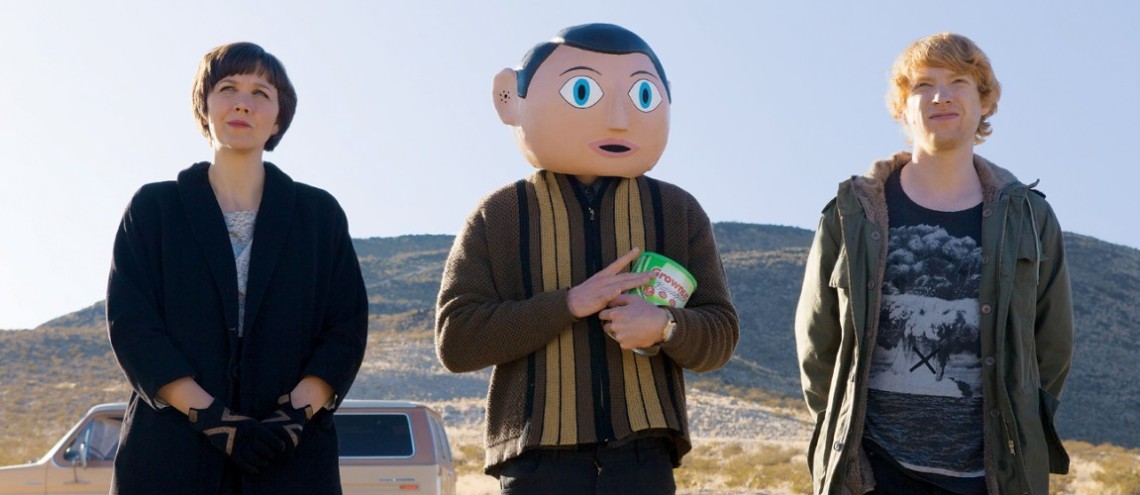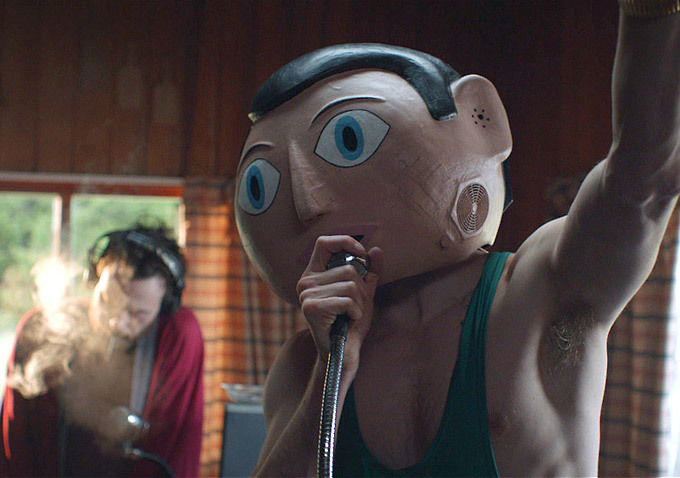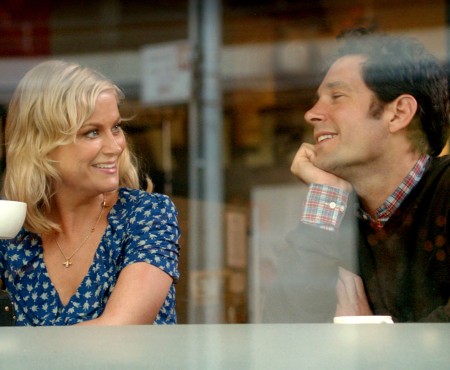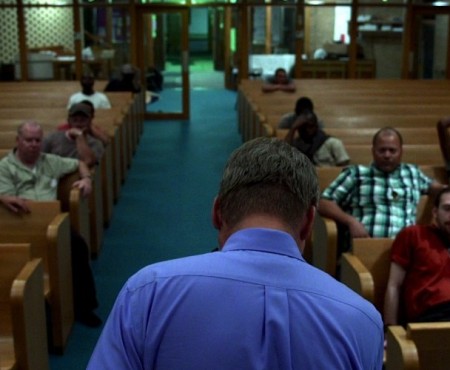Once there was an English musician-comedian named Chris Sievey who would perform wearing a large fake head under the name of “Frank Sidebottom.” Sievey was a thoroughly underground sensation for his whole career, until his death from cancer in 2010. Now, bits of Sievey’s life have been mixed with the Frank Sidebottom character, then doused in a liberal helping of further absurdity, all to make Frank, a movie about art and being an artist. Gonzo journalist Jon Ronson based the screenplay on his own article about Sievey and Sidebottom, which was drawn from his experiences playing in Sidebottom’s band. In his work, Ronson is often concerned with the mundane illogicality that drives much of daily life, and how it mixes in and out with what we might think of as “real” insanity. The film, then, feels like his movie through and through.
Michael Fassbender is Frank, a man wearing a humorous but also sort of terrifying giant fake head. It’s painted with a cartoonish face, and it looks a lot like Davey from Davey and Goliath, but if he imbibed generous quantities of mind-altering drugs that left him with a permanently vacant expression. Frank never, ever removes the head, and all the rest of his life appears devoted to some kind of performance art as well. He leads his band, “Soronprfbs” (don’t ask how it’s pronounced) in seeking some vague new sound, something that will expand the minds of all who hear it. They spend a whole year at a remote Irish cabin, eleven months of which is devoted to strange spiritual exercises and practice instead of recording. Along for the ride is audience surrogate Jon (Domhnall Gleeson), who became keyboardist almost by accident but now sees Frank and Soronprfbs as a way to perfect himself as a musician.
The nature of the Frank character means that anyone could have popped on the big fake head and stood around, but Fassbender turns in an amazing comedic performance, one that inspires tremendous empathy for the character to boot. His body language is delightfully on point. The way Fassbender uses his shoulders in this movie is funnier than a lot of entire comedies. And his voice, at first seeming to be a one-note “strange” accent that sounds not-unlike Ben Kingsley in the Mandarin persona, is also rife with subtle emotions and fluctuations. Frank is some kind of genius, though it may not be possible to articulate what kind. His music is eerie and disjointed but resonant. One conversation with a German woman (he speaks fluent German) leaves her raving about how he’s changed her life. He’s Christ with a cartoon head, and he even has the troupe of disciples to go with it.
Among this cast, Maggie Gyllenhaal and Scoot McNairy are the standouts. McNairy is Don, an old friend of Frank’s and the band’s manager. He has issues with romantic attraction to mannequins and is high-strung over getting their record done. Gyllenhaal is Clara, Frank’s right hand woman and the movie’s secret weapon. A knife-wielding theremin player who loves Frank and hates Jon. Clara’s attack-dog-like mentality is the film’s second-best source of humor after Frank himself, and Gyllenhaal’s vicious acting is a treat.
And then there’s Jon, both Peter and Judas combined in these disciples. Like Peter, he is enthusiastic in his support and devoted in his faith, but also impulsive and naive. And he’s Judas because, willfully or not, he’s working against the band’s artistic aims. He tries to apply the modern rigors of fame-seeking to a distinctly non-mainstream collective. Frank and his older followers are confounded by and in some cases distrustful of Twitter and YouTube. As they should be, since Jon pushes them to bland down their music in order to be more likable. He means well, but the nifty thing about the movie is that, even as it looks at these outsiders through an average person’s lens, it makes it clear how little the average person actually belongs among them. You can watch and appreciate, but few can actually do what Frank and his cohorts do.
It’s sort of a downer, then, that the film also deconstructs its premise by making no bones that Frank and some of the rest of Soronprfbs are mentally ill. Drastically so. Bringing that real world perspective in also means that at some times the movie skirts uncomfortably close to mockery. I’d have preferred things to stay in a heightened mode, because the way the film is seems to suggests that the best thing to do for the mentally ill is to indulge them. This despite the fact that two different characters attempt suicide in their untreated mania.
The last-act turn into seriousness is a drag, but the movie rebounds with a final bit of uplift, so it leaves you a good taste in your mouth. Frank is strange and hilarious, and it makes me hunger to see every available thing there is to watch about Chris Sievey. It’s a great movie about how one’s art is, ultimately, for oneself before anyone else. And if you can be happy with what you make, it doesn’t really matter what anyone else thinks (says the movie critic, aware of the irony).






















6 thoughts on “LAFF Review: “Frank” is Gleefully Manic Until Its All Too Real”
Pingback: The 2014 Cinematic Retrospectivus
Pingback: Blue Coaster33
Pingback: free movie downloads
Pingback: streaming movies
Pingback: watch movies online
Pingback: get satellite tv